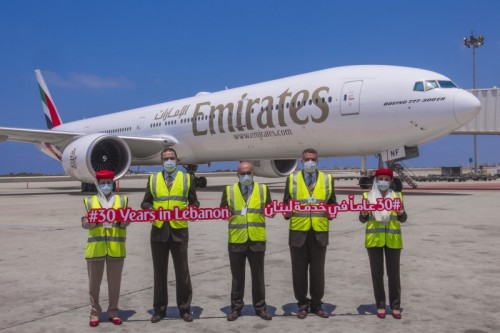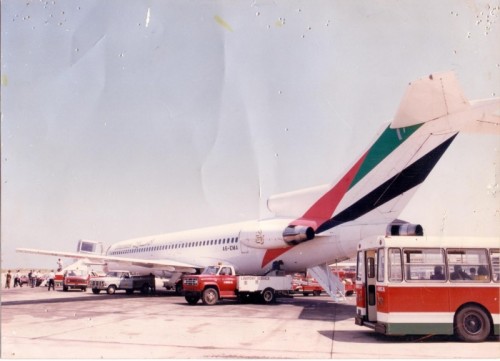Emirates Celebrates Three Decades Of Service To Lebanon

Emirates is celebrating its 30th anniversary of service to Beirut. The airline launched its first flight in 1991, and since then, Emirates has carried over 6 million passengers on over 35,000 flights between Dubai and Beirut, supporting the country’s tourism industry, growing trade lanes, and bringing Lebanese culture and traditions to the world.
Commemorating this significant moment, Emirates Regional Manager in the Levant, Tamador Dallal Kouatly, who has been with the airline in Lebanon since the start of operations reflects on the airline’s journey in the country within the last 30 years: “Throughout Emirates’ 30 years of operating to Beirut, our commitment to our customers has only grown stronger. We remain focused on delivering the best onboard comfort and hospitality, innovative technology that makes the journey easier and unparalleled connections to Dubai and beyond to connect Lebanon to the world, especially with its diaspora communities. We are thrilled our customers continue to reward us with their loyalty, allowing us to celebrate three decades of service in a key market like Lebanon. We look forward to continuing to serve the country, its communities and its people for the years to come.”
Celebrating a monumental milestone
Three decades after the first flight, Emirates employees who were part of the launch team recall the early days, and how they have grown with the airline:
Emirates, Deputy Airport Service Manager in Beirut, Marguerite Keyrouz, said, “I distinctly remember the pride I felt wearing the Emirates uniform and the excitement for the adventure ahead, and being in awe of the power of the aircraft landing in our airport, all feelings I have until this day. I am happy to see returning passengers, as they choose Emirates as their airline of choice, which motivates us to always provide the best service and experience.”
Raghida Zarkout, Emirates Airport Services Officer in Beirut said: “I still remember the first day at the airport, I recall my heart beating louder than the engines as the aircraft parked and we welcomed our first passengers. As the airline has grown over the past 30 years, I have also grown in my profession and can’t think of a better team and company to be a part of.”
To celebrate the occasion, Emirates will be serving traditional Lebanese dishes inspired by home on its route between Dubai and Beirut in the coming days, such as the Lamb Maklouba, and Barramundi Sayadieh. A signature sweet confection will round off the savoury mains with a strawberry Kunafa Fark, the airline’s rendition of a traditional Kunafa and Baklava Ashta, both adorned with the Lebanese flag. In addition, on Emirates’ menus across the network, Middle Eastern appetizers with Lebanese influence like hot and cold mezzes hummus, tabbouleh and mutable, are served in First and Business Class.
In March 2018, Emirates flagship double-decker aircraft became the first-ever scheduled A380 to arrive at Rafic Al Hariri International Airport, marking a historic moment for both the airline and the airport.
Standing with Lebanon
In response to the devastating Port of Beirut blast in August, 2020, Emirates rallied to support the Lebanese people alongside the Emirates Airline Foundation for cash or Skywards Miles donations to provide cargo space to ship essential items to those affected by the blast. In over just a month, more than 12,000 donations across 140 countries helped the airline uplift more then 160,000kg of much needed humanitarian cargo to Lebanon, working closely with local and international NGOs.
Opening trade lanes for local Lebanese businesses
As a way to facilitate trade and connect Lebanese business owners to Dubai and the world, Emirates transports goods to and from Beirut utilising the bellyhold cargo capacity on its passenger aircraft. Since 2016, Emirates SkyCargo has carried 67,000 tonnes of cargo to and from Beirut. From Lebanon, Emirates SkyCargo has transported 20,000 tonnes of fresh vegetables, fruits and chocolates to key destinations in the GCC and Jordan. Major commodities imported to Lebanon include 47,000 tonnes of fish, meat and consumer products such as cosmetics, uplifted from the U.A.E, China, Norway, Hong Kong and Germany.
Emirates initially started operations with three weekly flights, which grew to 21 by March 2020, supporting passenger demand. Utilising the Boeing 777, the airline currently operates 16 weekly flights to/from Beirut, providing better connectivity and ease of travel for tourists, business travellers and the Lebanese diaspora to destinations in Africa, Far East, Americas and the Middle East via its hub, Dubai.




